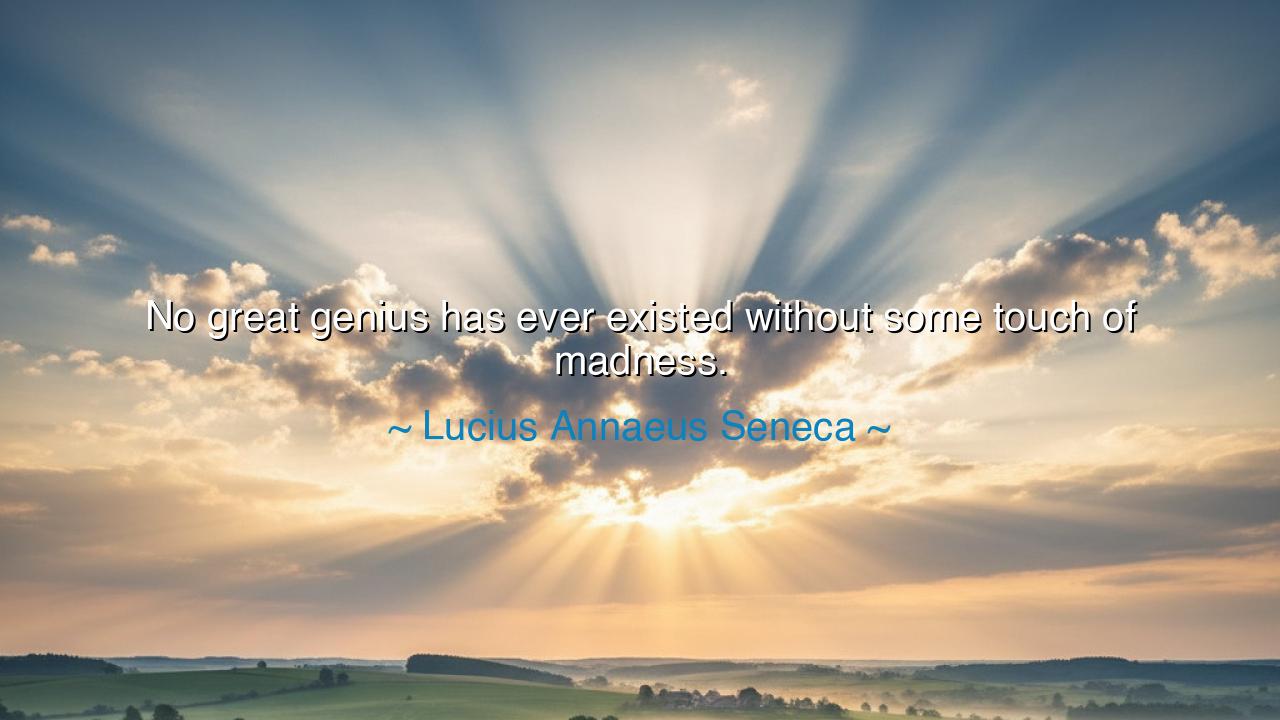
No great genius has ever existed without some touch of madness.






The Roman philosopher Lucius Annaeus Seneca, a man of reason and reflection, once wrote the immortal words: “No great genius has ever existed without some touch of madness.” In these words, Seneca unveils a truth that has echoed through every age—that brilliance and madness are twin flames, burning together within the hearts of those who dare to dream beyond the ordinary. Genius, in his eyes, is not the calm river of intellect, but the wild torrent of imagination, passion, and vision that defies the confines of reason. His statement is not a warning, but a revelation—that the power to create, to see beyond the veil of the mundane, demands a spirit bold enough to dance with chaos.
Seneca lived in the first century of Rome, a time of emperors and upheaval, when philosophy was not merely a discipline of thought but a weapon for the soul. As a Stoic, he believed in reason and self-control, yet he also understood the paradox that sometimes only those who are willing to lose themselves can discover something new. The phrase “a touch of madness” was not meant to glorify insanity, but to acknowledge that those who reach the highest peaks of human thought and creation must also venture into the shadowed valleys of obsession, risk, and passion. It is the tremor between stability and surrender that awakens true genius.
Throughout history, the truth of Seneca’s words has been made manifest again and again. Consider Ludwig van Beethoven, who, even as he descended into the silence of deafness, heard symphonies no other mortal could imagine. His mind burned with both torment and transcendence; his “madness” was not illness alone, but intensity—an inability to accept the world as it was, and an unyielding drive to shape it into sound and beauty. Or think of Vincent van Gogh, whose fevered brush captured not the world’s surface but its soul. His paintings are storms of color and emotion, born of a heart that could not rest within the boundaries of sanity, yet whose vision revealed eternity in a sunflower. These souls remind us that genius often walks close to the edge of reason, and that creation is born from both suffering and fire.
The ancients believed that divine inspiration and madness shared a common source. The Greeks spoke of the mania of the Muses—a sacred frenzy that descended upon poets, artists, and seers, granting them glimpses of truth inaccessible to ordinary minds. Plato, in his dialogue Phaedrus, declared that the greatest gifts of art and prophecy are born not of sober intellect, but of divine madness. Seneca, inheriting this lineage of thought, understood that to create something immortal, one must be willing to stand where order and chaos meet—to let one’s reason be illuminated, and at times unsettled, by the spark of the infinite.
Yet, Seneca’s insight is not merely about artists and philosophers—it speaks to every human being who seeks to live deeply. To have a touch of madness is to feel life more vividly, to question what others accept, to pursue dreams others deem impossible. It is the refusal to let fear tame the imagination. Madness, in this sense, is not destruction but devotion—a willingness to follow an idea, a calling, or a passion beyond the limits of convention. Every great discovery, every revolution of thought, every masterpiece of the spirit has begun with someone brave enough to be “mad” in the eyes of the world.
But there is danger in this fire. Seneca knew well that madness without wisdom consumes, while wisdom without passion withers. The harmony of genius lies in balance—the mind must be bold enough to wander, but disciplined enough to return. The Stoic in Seneca reminds us that even as we embrace our creative madness, we must anchor it with reason, lest the storm within us become our ruin. The challenge is not to extinguish our wildness, but to guide it—to let it power our art, our vision, our purpose.
The lesson, then, is clear: do not fear the strangeness within you. That restless curiosity, that insatiable longing, that fire that others may not understand—these are the marks of creation, not curse. Practical action: nurture your “madness” wisely. When inspiration grips you, follow it; when passion seizes you, honor it—but temper both with reflection. Learn to dwell at the edge of reason, for there, between order and chaos, lies the birthplace of greatness.
Thus, let Seneca’s words ring as a reminder for all who strive to create, to lead, or to dream: “No great genius has ever existed without some touch of madness.” For it is only those who dare to be slightly unbound—who allow the wild spark to light their way—who change the world and leave behind something eternal.






AAdministratorAdministrator
Welcome, honored guests. Please leave a comment, we will respond soon